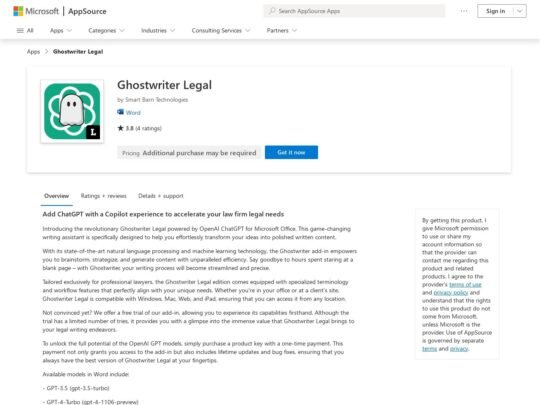Ghostwriter Legal - AI Legal Tools
Ghostwriter Legal
In the ever-evolving legal landscape, technology is playing an increasingly significant role. One such tool, Ghostwriter Legal, offers legal professionals an innovative way to streamline their workflow and enhance their efficiency. Here’s a detailed breakdown of what it is and how it might impact the legal field:
What is Ghostwriter Legal?
Ghostwriter Legal isn’t a legal entity or practice, but an AI-powered writing assistant designed specifically for lawyers and legal teams. It utilizes technology like OpenAI’s ChatGPT to understand natural language and generate legal documents based on user input.
How does it work?
Ghostwriter Legal operates within the Microsoft Office suite, integrating with applications like Word. Users can leverage the tool by:
- Providing instructions: The user outlines the desired document type, key points, and relevant legal citations.
- AI generation: Ghostwriter Legal utilizes its AI capabilities to draft a legal document based on the provided information.
- User review and editing: The generated document serves as a starting point, allowing the user to review, edit, and refine it as needed.
Benefits of using Ghostwriter Legal:
- Improved efficiency: By automating repetitive tasks like drafting standard legal documents, Ghostwriter Legal allows lawyers to focus on more complex legal matters and client interaction.
- Enhanced accuracy: The tool can assist in maintaining consistency and reducing errors in legal documents by referencing legal databases and ensuring proper formatting.
- Increased productivity: By streamlining the drafting process, Ghostwriter Legal can help legal teams meet deadlines more efficiently and handle a larger workload.
- Cost-effectiveness: As compared to hiring additional legal staff, utilizing an AI tool like Ghostwriter Legal can be a more cost-effective approach.
Limitations and considerations:
While Ghostwriter Legal presents numerous advantages, it’s crucial to remember its limitations:
- Not a substitute for legal expertise: The generated documents are meant to be starting points and should not be taken as legal advice. Lawyers retain the responsibility for ensuring the accuracy and legal soundness of all documents.
- Limited scope: Currently, the tool may not be suitable for highly complex legal documents or situations requiring nuanced legal judgment.
- Ethical considerations: Using AI tools raises ethical concerns regarding transparency and potential misuse. It’s essential to be transparent with clients about the use of such tools and ensure adherence to professional ethics.
Overall, Ghostwriter Legal represents a promising advancement in legal technology. However, it’s vital to utilize it responsibly, with a deep understanding of its capabilities and limitations, while maintaining the ethical cornerstone of the legal profession.


 (11 votes, average: 4.50 out of 5)
(11 votes, average: 4.50 out of 5)


